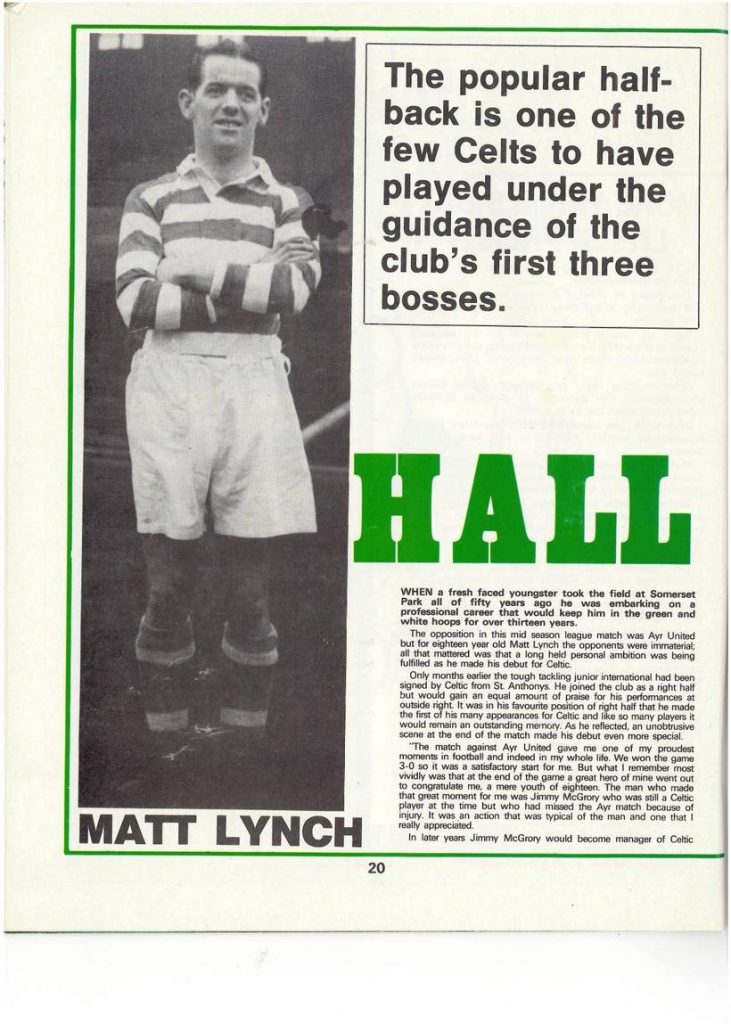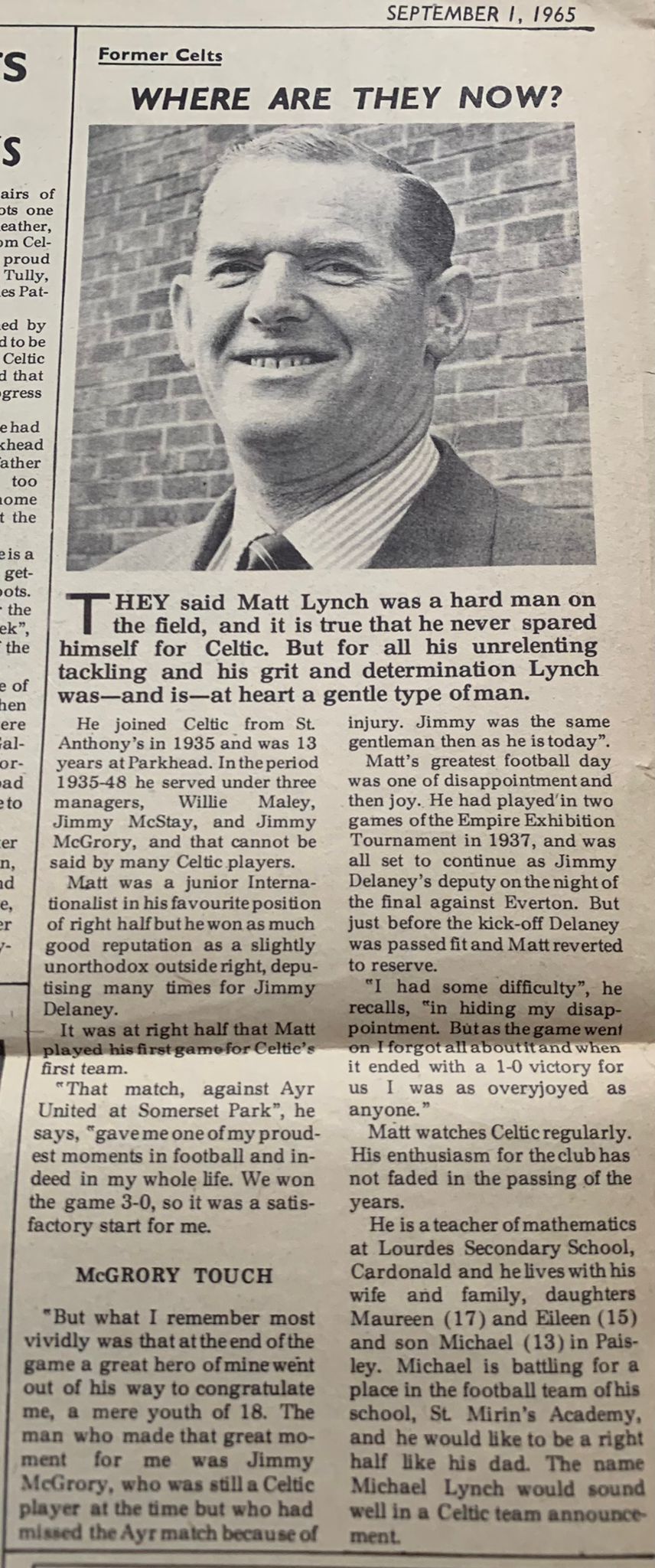L | Player Pics | A-Z of Players
Personal
Fullname: Matthew Lynch
aka: Matt Lynch
Born: 29 November 1916
Birthplace: […]
Died: 3 September 1999
Signed: 22 Aug 1934
Left: 5 May 1948
Position: Wing (Outside-right), Centre, right-back, half-back (Utility player)
Debut: Ayr Utd 1-1 Celtic, League, 20 Nov 1937
Internationals: none
Biog
Celtic were at their poorest throughout much of Matt Lynch’s time at Celtic, but the First Team would have been even poorer without him.
World War Two hit Celtic far worse than many other clubs and the board’s incompetence combined with Rangers’ ability to take advantage and use the establishment to their advantage meant that Celtic were left floundering.
Celtic were said to lack any real strength but one player they could depend on (apart from the indomitable goalkeeper Willie Miller) was Matt Lynch. He was the muscle in the side that kept the First Team going and kept them in games which otherwise we’d have been lost in.
Brought in to the First Team to help meet the impossible requirement to fill the boots of the recently transferred Willie Buchan, Matt Lynch began a long career with the Celtic First Team. He was Chic Geaton’s deputy and had a big job to do.
Pre-war it had all started very well. Celtic won the league in 1937-38 which should have provided a good platform for Matt Lynch & the club for subsequent years.
He joined the club as a right half but would gain an equal amount of praise for his performances at outside right. He was said to hit a beautiful cross, and in a 6-1 win over Clyde he scored his first goal having been moved to outside-right with Chic Geaton returning.
Matt Lynch is also remembered for the Empire Exhibition Trophy of 1938. He played on the right wing in the a replay match v Sunderland and against Hearts in a semi-final. Sadly he lost his place for the final to the returning Jimmy Delaney.
From then on in, sadly things weren’t to be so victorious and great again for Matt Lynch. The war was to begin, a new manager (Jimmy McStay) was brought in and the board mismanaged the club (forget about even the SFA and Rangers).
Due to the limitations on players (due to the war effort) it was quite a feat for Matt Lynch to have remained with Celtic during the whole War Years. Most players had to combine working alongside their football training to keep going (many Rangers players got some easy jobs at the shipyards!). The sacrifices they had to make is quite difficult for us to imagine, but he did so and the club has a lot to thank all like him who did so.
Rangers had their hands on the gears and used the authorities to carve out their hegemony in Scottish football. In one match v Rangers on Jan 1943, Matt Lynch joined Malky MacDonald after being sent off in the infamous 8-1 defeat. He is said to always raise his game v Rangers but in truth Celtic’s record during WW2 against Rangers was woeful (it might have been even worse if it wasn’t for Matt). Tempers were frayed in these games as they had a heightened sense of tension due to the war and other issues and this continued beyond the war.
For Matt Lynch, he had the ignominy to be part of some of the poorest Celtic sides. Celtic were woeful throughout the Second World War and for much of the post-war period. Matt Lynch had to help buffer up the side to keep Celtic going. This was in a truncated league as well.
Celtic were said to have teams lacking in “physique and experience“.
Matt Lynch played his last match for Celtic against St Mirren in February 1947 after 14 years service with the club. It was the end of an era for him, but sadly due to circumstance, club mismanagement and poor luck, Matt Lynch was to leave Celtic with far less honours than he deserved to hold. He didn’t even win a Scottish Cup medal.
However, he never lost his love for the club. He became Honorary President of the Celtic Supporters Association remaining involved with Celtic attending monthly delegate meetings and other relevant functions. The Association, in appreciation of his dedicated service sent him on an all expenses trip to Rome. He was also a regular attender at all of Celtic’s home matches. As a man who never spared himself for the club he was always a welcome visitor.
An intelligent man, he graduated from Glasgow University with a BSc in 1942; note this was in the days when going to University was more limited especially as it was a time of rationing and social adjustment, so his achievement has much to applaud and admire.
He later became a maths teacher at both St Gerard’s and Lourdes Secondary Schools on Glasgow’s south side, and held his pupils in awe of him when he spoke about his days with Celtic, his friendship with Jock Stein and his opinions on the current side (this was the 1970’s).
He was also a man of great faith, and on his death in September 1999 there were said to be hundreds who turned out to pay their respects to this great Celtic man.
Playing Career
| LEAGUE | SCOTTISH CUP | LEAGUE CUP | EUROPE | TOTAL | |
| APPEARANCES | 48 (0) | 9 (0) | 6 (0) | 0 (0) | 63 (0) |
| GOALS | 2 | 0 | 0 | 0 | 2 |
| REGIONAL LEAGUE |
SCOTTISH WAR CUP |
REGIONAL LEAGUE CUP | Total | ||
| APPEARANCES | 119 | 2 | 22 | 143 | |
| GOALS | 25 | 0 | 3 | 28 |
Honours with Celtic
Scottish League
Empire Exhibition Cup
Pictures
Articles
Articles
WHEN a fresh faced youngster took the field at Somerset Park all of fifty years ago he was embarking on a professional career that would keep him in the green and white hoops for over thirteen years.
The opposition in this mid season league match was Ayr United but for eighteen year old Man Lynch the opponents were immaterial; all that mattered was that a long held personal ambition was being fulfilled as he made his debut for Celtic.
Only months earlier the tough tackling junior international had been signed by Celtic from St. Anthonys. He joined the club as a right half but would gain an equal amount of praise for his performances at outside right. It was in his favourite position of right half that he made the first of his many appearances for Celtic and like so many players it would remain an outstanding memory. As he reflected, an unobtrusive scene at the end of the match made his debut even more special.
“The match against Ayr United gave me one of my proudest moments in football and indeed in my whole life. We won the game 3-0 so it was a satisfactory start for me. But what I remember most vividly was that at the end of the game a great hero of mine went out to congratulate me. a mere youth of eighteen. The man who made that great moment for me was Jimmy McGrory who was still a Celtic player at the time but who had missed the Ayr match because of Injury. It was an action that was typical of the man and one that I really appreciated.
In later years Jimmy McGrory would become manager of Celtic and Matt Lynch would feature in his teams. The popular half back is one of the few Celts to have played under the guidance of the clubs first three managers. Prior to McGrory’s appointment Celtic had been under the tutelage of Jimmy McStay and Willie Maley. Of these gentlemen there is no doubt that the most influential in determining the early development of Celtic football club was Maley. He served the club for an incredible fifty two years, and his life and that of Celtic are virtually inseperable. Maley had the reputation of being a strict disciplinarian and despite acknowledging his contribution to Celtic, it was a viewpoint with which Matt Lynch concurred.
“Willie Maley was a great man but a person I used to regard with awe. Most of the time he was ensconced in his office and was not directly involved with our training. Now and again he would walk out the tunnel and when the players saw the familiar figure with the black crombie coat and stetson type hat you never saw such activity on the track.
It was a situation similar to the headmaster and pupil type of relationship, yet it was a style of management that brought results. Jimmy McStay was different in character. A quiet man he was there in difficult circumstances, similarly Jimmy McGrory was also very much a gentleman and although it’s often been repeated both seemed too nice to be really successful managers.”
Despite the domestic success achieved by the club the Celtic side of this era is primarily remembered for its triumph in the Empire Exhibition tournament of 1938. The competition was played at Ibrox in the summer of that year as part of Glasgow’s contribution to the Empire Exhibition which was centred at nearby Bellahouston Park, Celtic progressed to the final at the expense of Sunderland, after a replay, and Hearts. A goal by Johnny Crum was enough to defeat Everton in the final.
For Matt Lynch Celtic’s success must have had a bitter sweet feeling about it. Having played extremely well against Sunderland and then Hearts he was all set to continue as Jimmy Delaney’s deputy on the eve of the final. But just before kick off Delaney was passed fit and regained his place in the side. As Matt recalled he was to suffer disappointment and joy in a short period of time. “Certainly it was a terrible let down for me when I knew I wouldn’t be playing and I had some difficult in hiding my disappointment Once the game started I forgot all about it and when it ended with a 1-0 victory for us I was as overjoyed as anyone.”
Matt Lynch played his last match for Celtic against St Mirren in February 1947 after 14 years service with the club. His final match, like his debut would result in victory. Since then the passage of time has not dimmed his enthusiasm for the club. He became Honorary President of the Celtic Supporters Association remaining involved with Celtic attending monthly delegate meetings and other relevant functions. The Association, in appreciation of his dedicated service sent him on an all expenses trip to Rome. The former right half was a regular attender at all of Celtic’s home matches. As a man who never spared himself for the club he will always be a welcome visitor.
Matt Lynch died in early September 1999.

